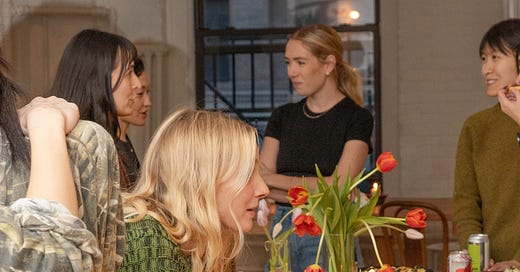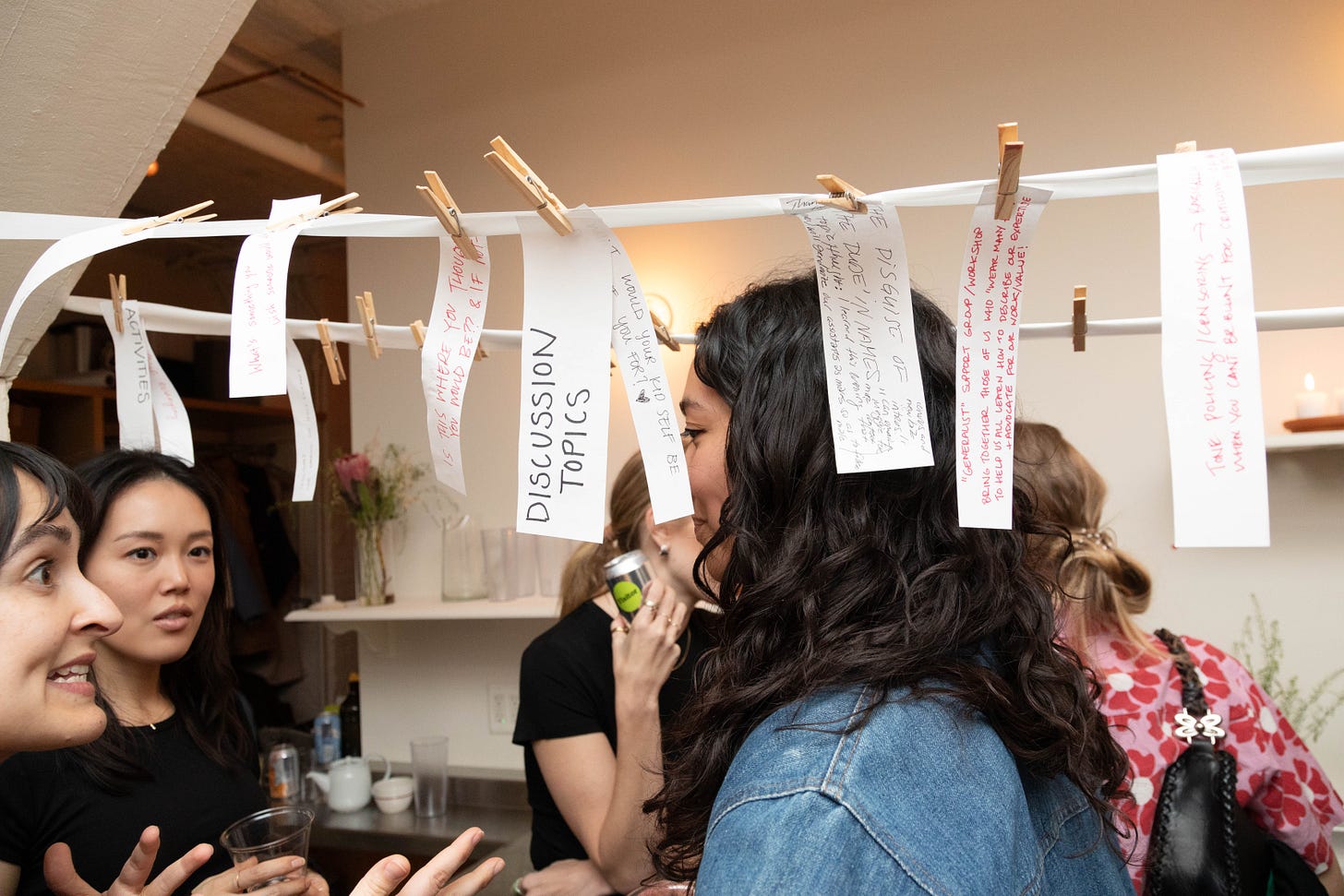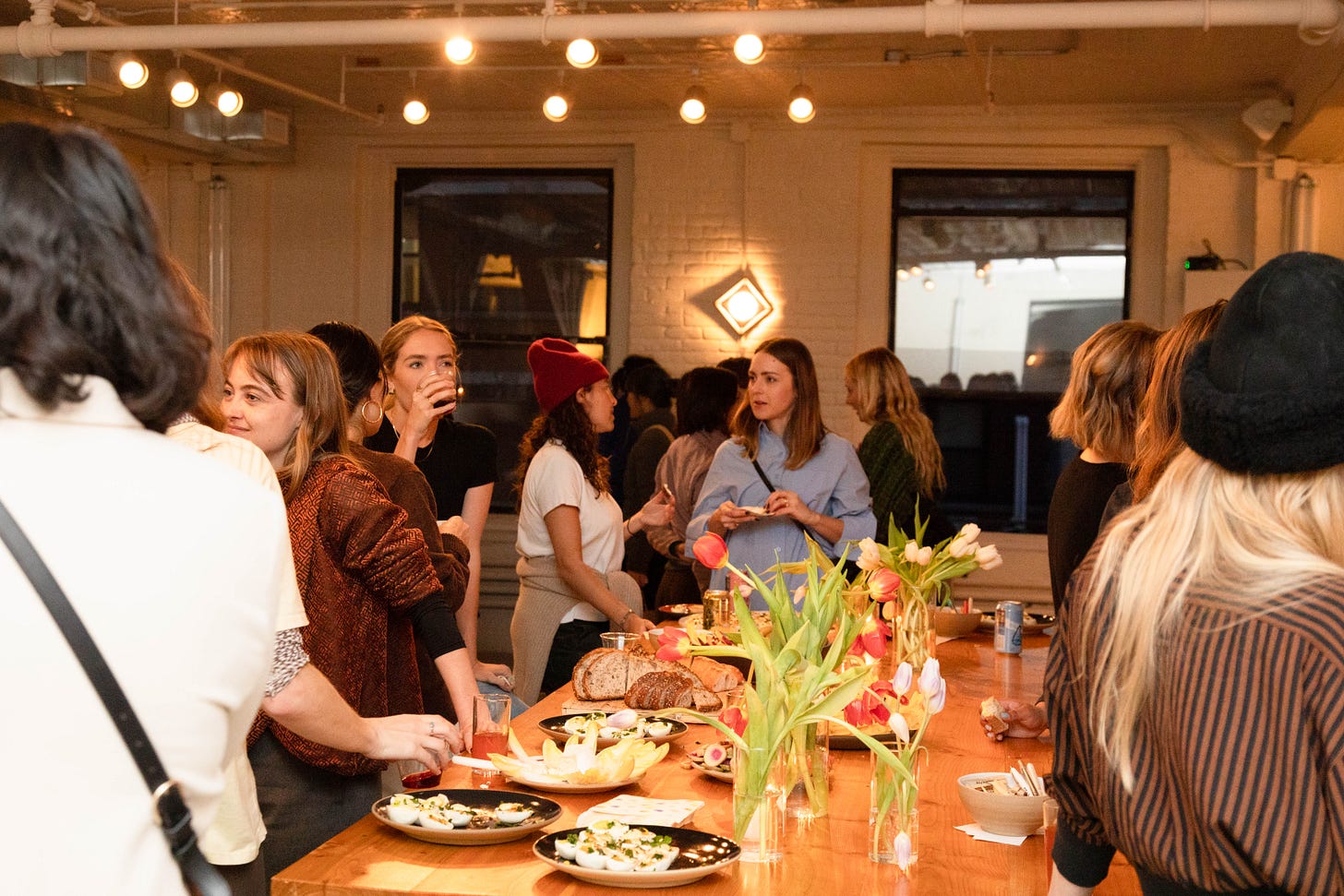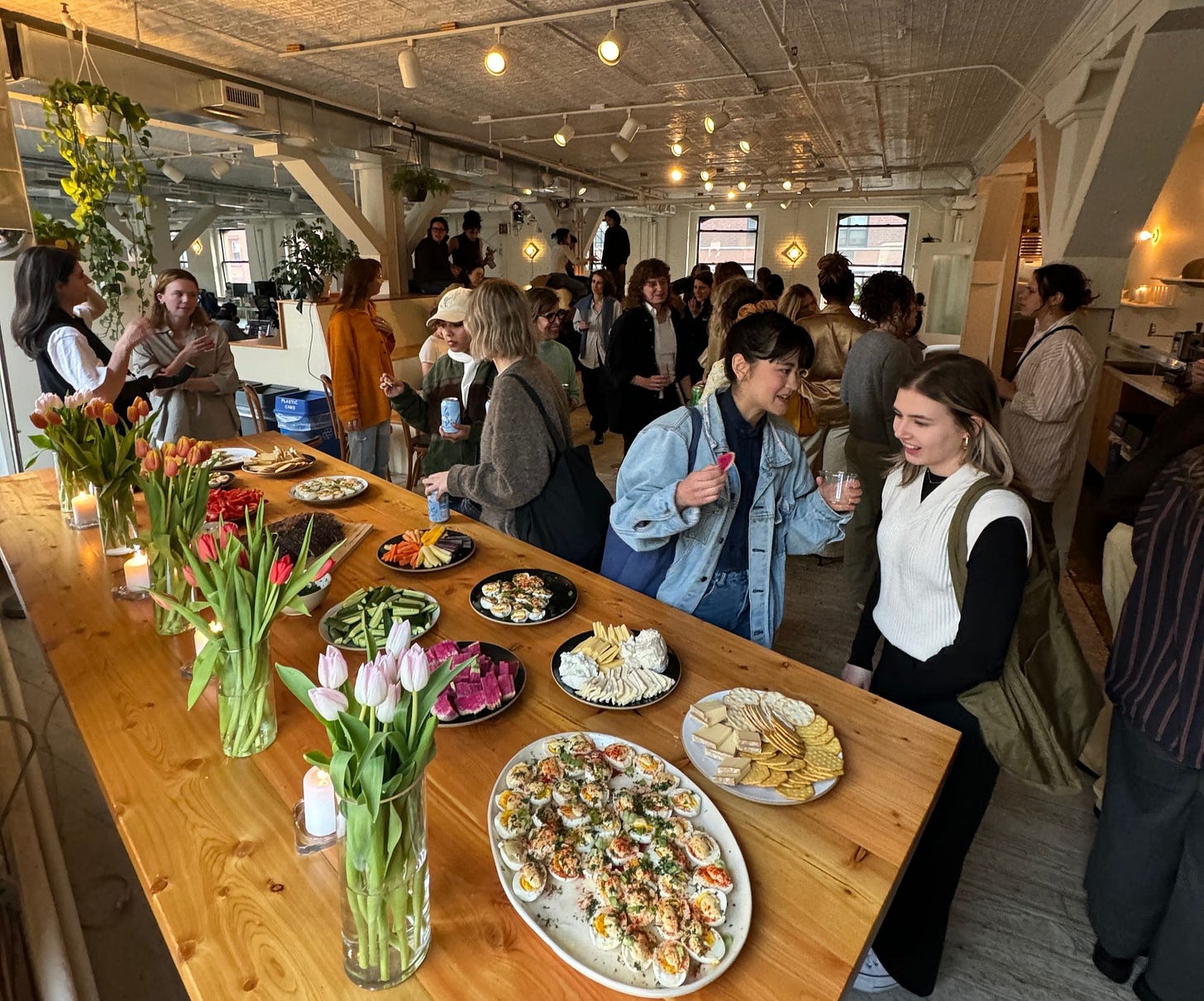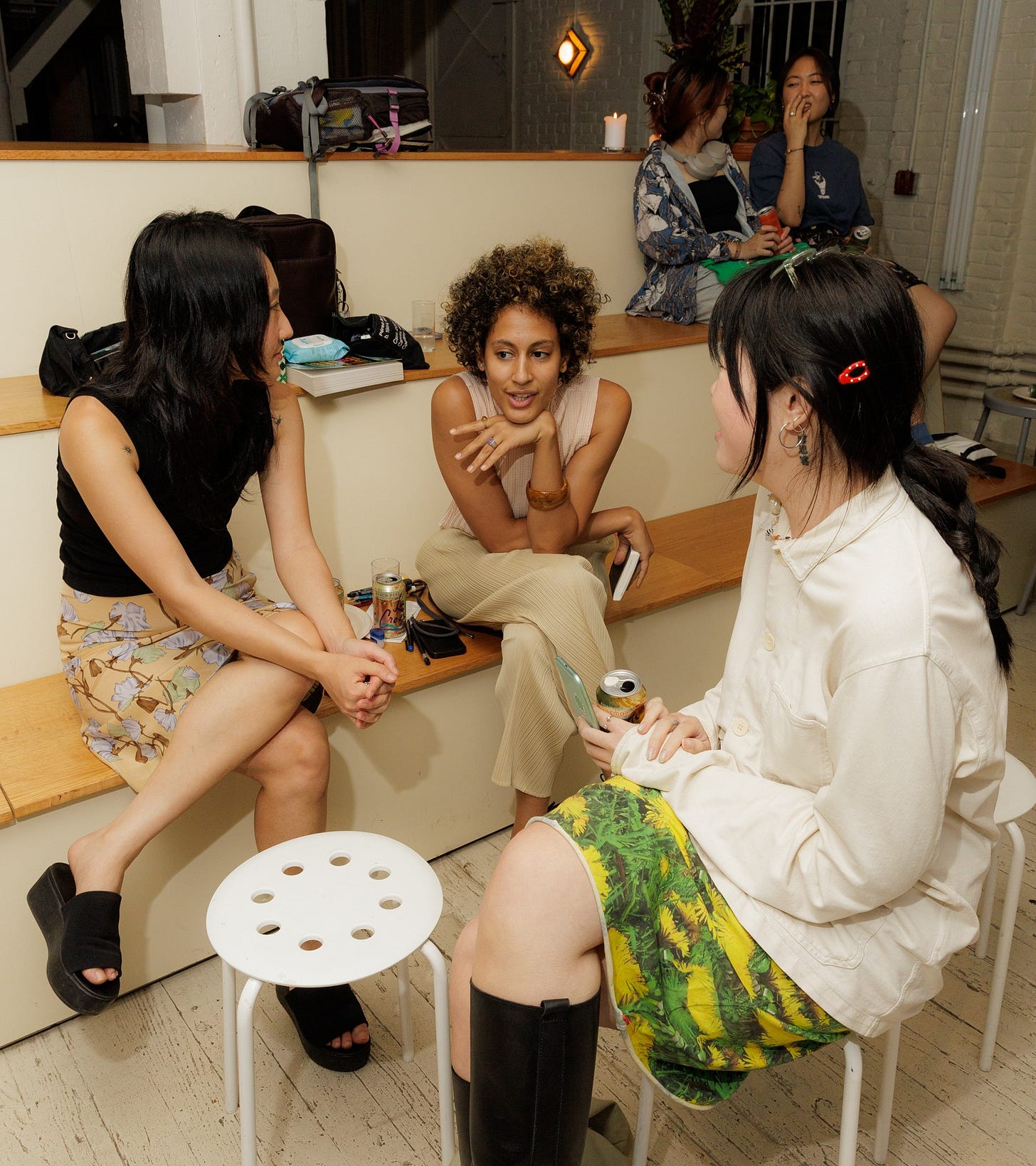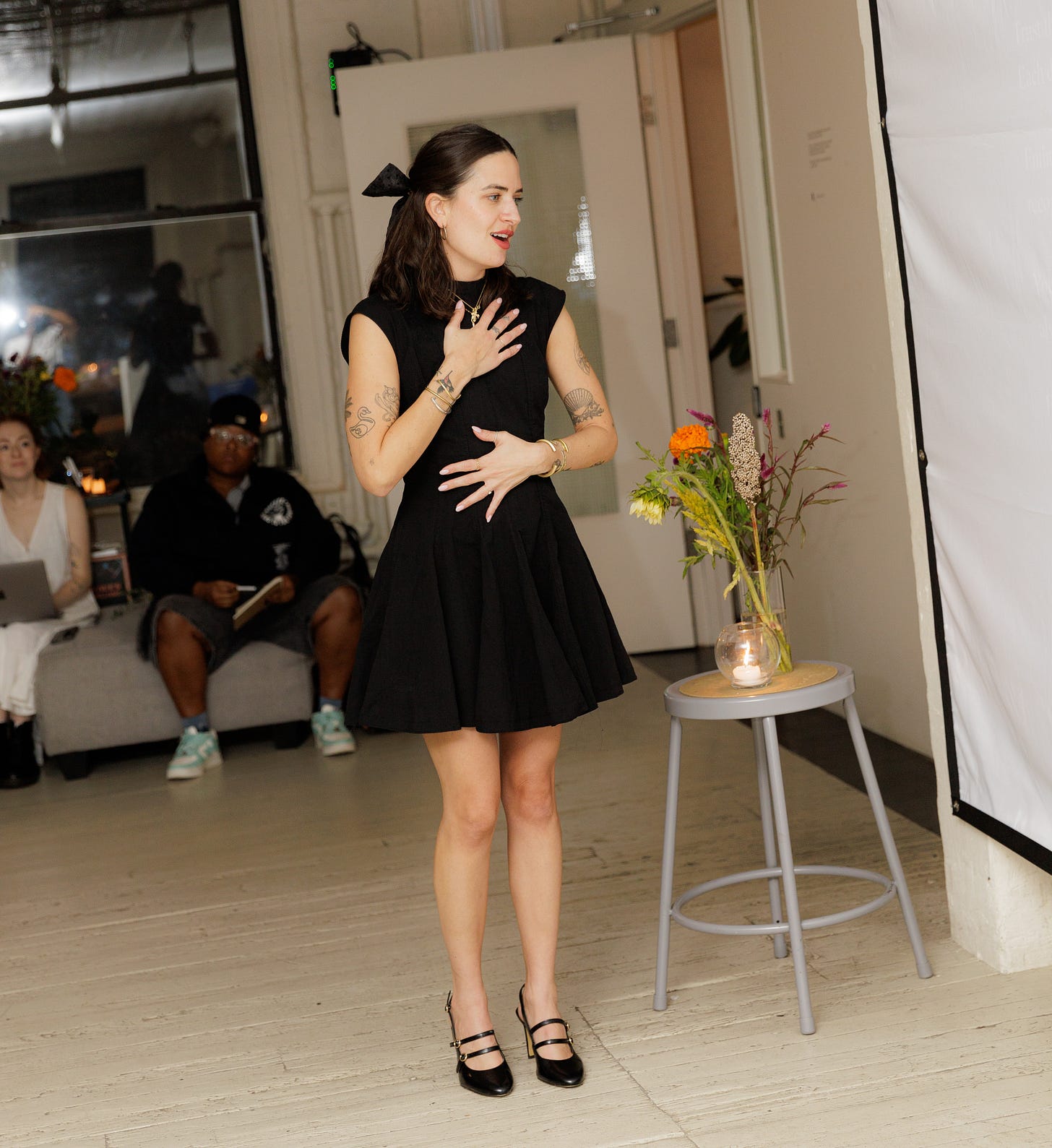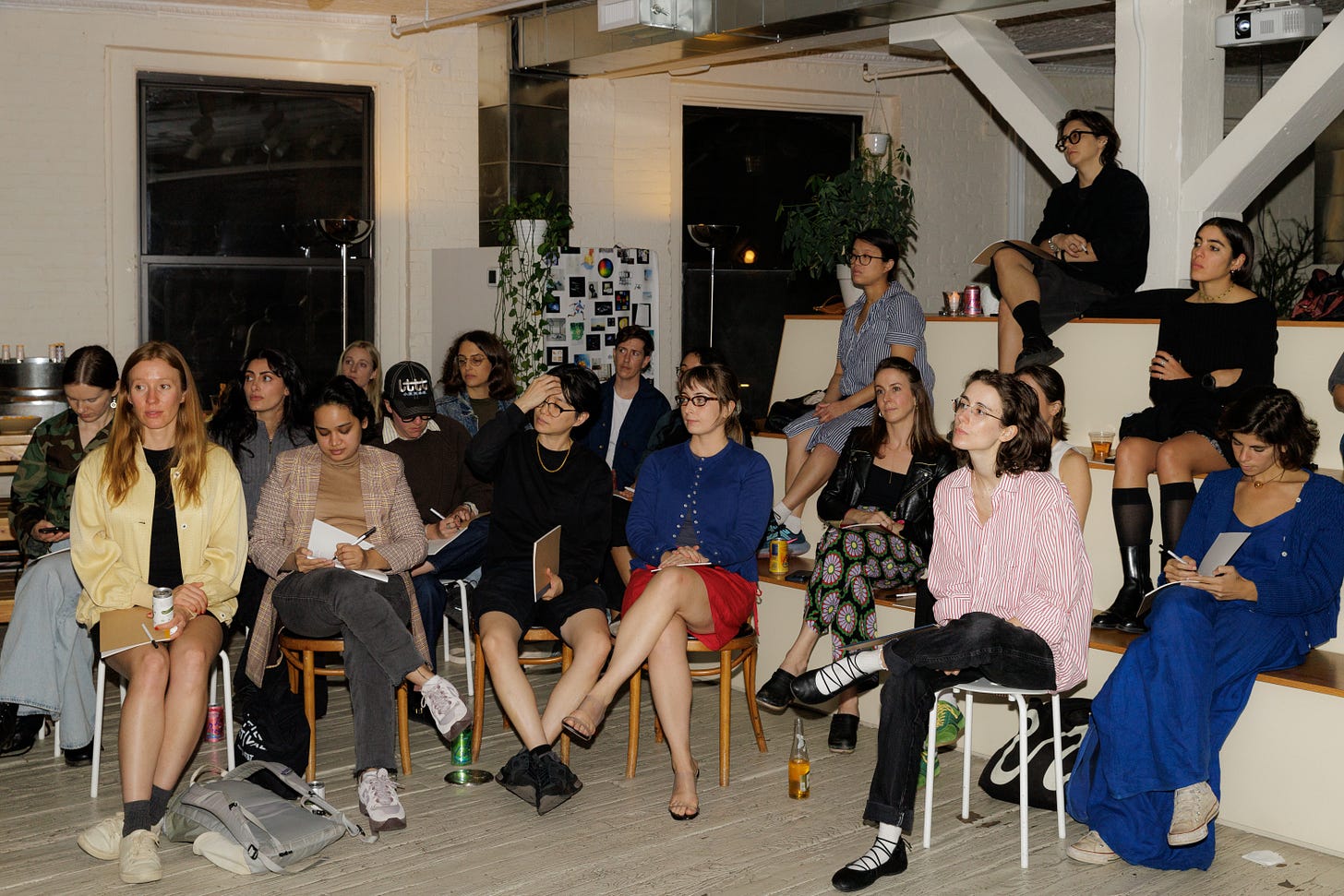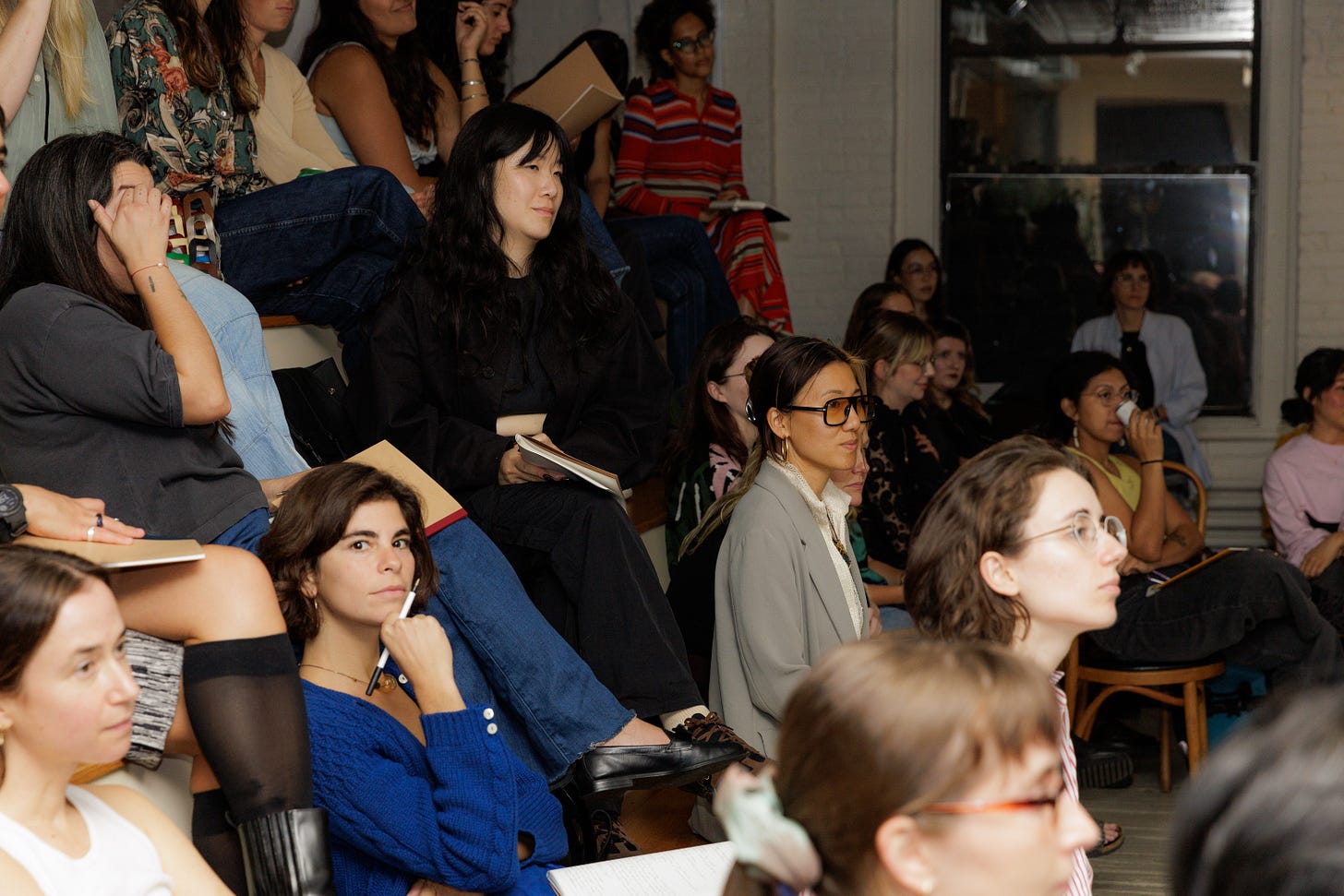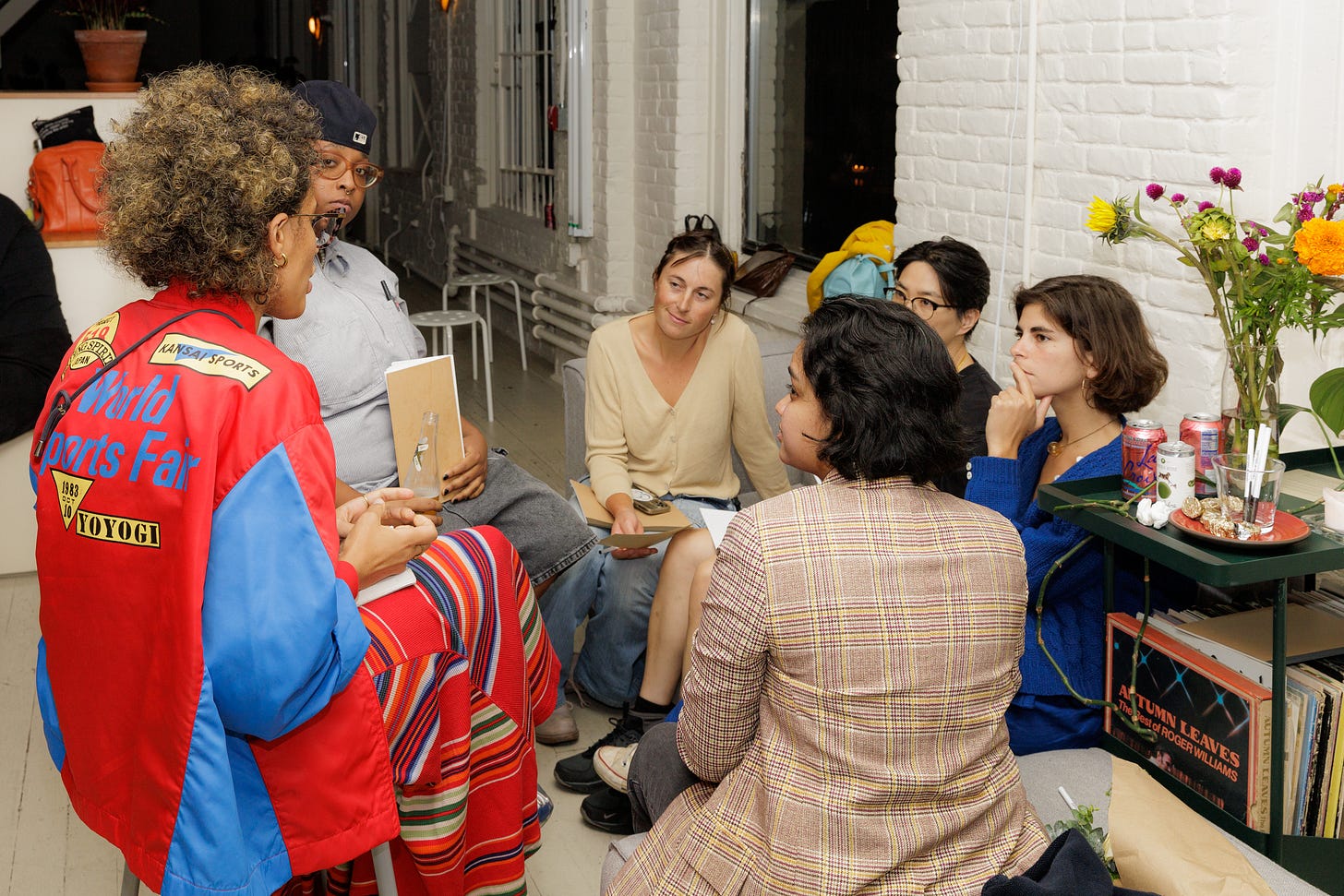Carving Out pockets: Building Community and Collective Power in the Creative Industries
Finding connection, sharing resources, and building collective power as gender non-dominant people in the creative industries
It’s no secret that the creative industries continue to be male-dominated, leaving non-dominant genders looking for representation and community amongst themselves. It was for this reason that we decided to start a working group at garden3d called Gardenxrs, to create a space for those of us who exist as non-dominant gender groups to connect on a more personal level and support one another within our professional environment. (You can read more about Gardenxers and our other working groups in the garden3d DEI Report 2024)
The benefits of this group were almost instantly apparent. Once each month we set time aside to ask each other “How are you, really?” without the expectation of an automatic “Good, and you?” and with the understanding that the people asking truly want to know. Seeing how much morale this built, we knew there was a need for this very specific type of space beyond garden3d—a pocket of space dedicated to finding connection, sharing resources, and in doing so, building collective power. We reached into our local network at Index to begin a new events series called pockets, to cultivate this ethos in our larger community.
Our inaugural gathering was in March of 2024, where we openly discussed our hopes and intentions for the future of pockets, collecting feedback from those who attended.
In 2024 we hosted three events, featuring ten different speakers in various discussion formats, and covering topics from post-patriarchal leadership to manifesting the life of your dreams.
In Building New Models for Post-Patriarchal Leadership, Morgan Evans, founder of Business Casual, led a panel discussion with Oyinkan Olojede, Nicole Irizarry, Elise Mortensen, Toshika Kosako, and Rachael Yaeger to imagine a radical new future for leadership. In Gender and Presence Online: A Multi-Player Artists’ Interview, artists Ari Melenciano, Maya Man, and Nahee Kim considered the bounds and possibilities of the online self. And in Beyond the Veil, instructor of Index’s Artistic Alchemy course Ella Fitch conjured the wisdom of The Artist’s Way for an expert guide to manifesting success.
Following each event, we released a Dispatch of the conversation, reporting on key moments and memorable quotes from each event. Read on for the highlights from each Dispatch, and our favorite memories from last year’s pockets community.
Building New Models for Post-Patriarchal Leadership
On April 30, 2024, pockets hosted its first panel discussion at Index NYC, featuring six people in our orbit who are leading their organizations with a post-patriarchal future in mind. We turned to Morgan Evans, founder of Business Casual, to guide us through a discussion of our longstanding ideas of leadership and our hopes for more inclusive and informed models of leading.
Our panel included Oyinkan Olojede, co-founder of FourTwo Creative; Nicole Irizarry, former creative operations for XXIX and Sanctuary Computer; Elise Mortensen, head of growth at HTD Health; Toshika Kosako, founder and director of monopo.nyc; and Rachael Yaeger, co-founder of Human NYC.

Excerpts from our panel:
Morgan prompted us to think about what this topic actually looks like: “Leadership is one of those things that’s hard to define, but you know it when you see it. You can see it in children, you can see it in animals, and see it around you. When did you first recognize leadership in yourself? How do you recognize it when you see it in your world?”
Oyinkan reflected on her own conflicting ideas of leadership:
”The idea I had about leadership was always about someone being in charge and giving directions—they’re the boss and everyone else is listening. But the way I see leadership now is a lot more about support and understanding. Being able to read people and what they need. And so in that sense I think I’ve always been a leader. But I didn’t realize I was because it didn’t match the definitions that were being shown.”
Nicole provided context for pockets and its origins:
”This event, pockets, came from a working group that we have at our company called Gardenxrs. We chat once a month, and this is the group out of my entire company that I feel the most supported by. This support system carries different skill levels, so there’s obviously going to be inherent soft power within a group like this, and I want to acknowledge that. But, I think I texted [Bre] the other day, like, “Can we just make Gardenxrs the entire company?” We listen to each other, we care for each other, we support each other—it’s this communication and way of caring for each other with honesty. If the communication isn’t there and you’re not acknowledging things like soft power and hierarchy that exist, your foundation breaks down really fast.”
Rachael underlined the importance of unity:
”This type of support system often comes from everyone approaching things from the same level of understanding. So if you have a group of people all subscribing to the same theory, it’s easier to come together to implement change.”
Elise confronted age-old advice:
”The advice that I got many years ago starting out in a male-dominated field was “Fake it ‘till you make it,” and I hate that. I think that’s actually the problem. When people pretend to have all the answers and come in over-confident, other people pick up on that and it makes making that connection a lot harder. The more that someone in a leadership position, who is guiding a group, can break down the decision-making and actually be transparent, the easier it is to get people on the same page.”
Toshika pointed out some gender differences in asking for more:
”There’s this statistic that men tend to apply for positions if they meet 60% of the job criteria, while women only apply if they meet 100% of the criteria. And not that this applies in the arrogant way of “Fake it ‘till you make it,” but just giving yourself the confidence is something we want to keep. Especially if you’re a minority, and you’re marginalized, I think we have to have a space like this where we can tell each other that we believe in each other, we trust each other—that kind of culture is really important to building up that confidence in a genuine way.”
Read more from Building Models for Post-Patriarchal Leadership.
Gender and Presence Online: A Multi-Player Artists’ Interview
In a time when the physical body is no longer essential for self-representation, what possibilities are available to us as we navigate the expanse of life on the internet? On August 27, 2024, We explored this topic in conversation with three artists whose work centers the portrayal and performance of identity—and often gendered identity—online. In this multi-player interview format, each artist prepared questions for one another, exploring common themes, intersections, and departures within their practices.
Ari Melenciano’s expansive practice includes the arts, technology, design, culture, and pedagogy, from using AI through critical and imaginative lenses and sound design using botanical data. She founded Afrotectopia, a social institution that imagines new possibilities at the nexus of art, design, technology, activism, and culture.
Maya Man is an artist focused on contemporary identity culture on the internet, particularly around femininity, authenticity, and the performance of self online. She is the creator of the browser extension Glance Back and the Art Blocks curated collection FAKE IT TILL YOU MAKE IT. Her artwork has been featured in publications including Art in America, Forbes, Vogue, Dazed, and exhibited internationally.
Nahee Kim (She/They) is an artist and programmer who explores how sexuality can be represented through computational technology. nahee.app is Kim’s virtual persona, through which they create code poems about sex and visual documentation of speculative sex toys and networks, speculating how computer programs might enhance love and satisfaction through sexual communication.
Ari Melenciano: In a dream world, what would it take for you to make content that doesn’t feel cringy? Something that you create just because you want to, and not think about how anyone is going to receive it?
Maya Man: I don’t believe in authenticity on the internet. I don’t believe there’s any true way to be online when you’re intentionally sharing something for a public audience. Whenever someone’s like, “Oh, I just post for myself for fun,” I’m like, don’t lie—because I think we all villainize that, posting with other people in mind, when that’s just living. In social situations where you’re being observed by other people, you’re living according to what the context calls for, but you’re not being fake.
I talk about this book all the time, The Presentation of Self in Everyday Life, by the sociologist Erving Goffman. It was written in the late ‘50s, but he basically has this philosophy of socializing being a performance. So rather than trying to post in a way where I’m like, “Oh, I don’t care what anyone thinks,” I now post in a way that I want to be seen. But that’s not bad or evil, that’s just sort of what these platforms are for, and that way of thinking about it has freed me from a lot of the guilt and shame that I was really wrapped up in, in my earlier days on social media. There’s something about the act of organizing yourself to be shared that, when I look at it afterward, I learn something about myself that I couldn’t have figured out before this process. And I think that’s a very beautiful part of being online, the self-actualization that can happen.
Maya: Ari in your work, you’re producing these different identities through AI, and in a way it feels like window shopping to me. Like trying on identities in a way that’s non-committal. How does it feel to be able to render yourself in these different ways?
Ari: I realized how rigid I was in the way that I presented myself. What I’m unpacking even now is that I feel like I have a loyalty to people and how they expect I’m going to show up. And that, if I change that, they’re going to be shocked and lose the Ari that they think they know.
So with these AI images, it became a way to put myself out there in different versions that I had never shared before, adding these avatars into this pool of my identities. Now, because I put out so many versions of me, I feel a lot more free. It’s just more ideas I can give you about who I could be. This past summer I had a residency where I used motion capture to dance and move around, and capture my body in these data points that I could then apply to 3D characters. As someone who is introverted, the idea of dancing in front of people was just not something I thought I’d ever do, but doing it this way gave me a little more comfort. I don’t like to put stuff online that would allow people to sexualize me in a very explicit way, so to be able to dance and do it through an avatar felt like I was creating a bit of distance, a layer outside myself.
Ari: Nahee, this made me think of your work, where you’re able to explore your sexuality with a bit of abstraction through technology. And so I wonder, what makes you want to abstract that layer? Is there a reason why you don’t want it to be associated so personally with your own identity?
Nahee Kim: For some it’s still so taboo, to be talking about very personal sexual relationships in public. Even though I’m really interested in talking about these topics with my close friends, I don’t think I know how to do this in a more public setting with random people, even if I do enjoy the topic. But I do know that something important can come out of having that conversation.
So first, I think it’s coming from a discomfort of directly using my body, my face, to talk about those things that are really personal and connected to my experience. By having this distance through social media, I can explore this deeper layer of my identity. And I want to see how people will actually perceive that from a safe distance—will they see it as playful or also really uncomfortable? Building the @nahee.app persona and introducing my work through that account helped me slowly build an audience for this weird project, but also to meet those kind of allies who already are familiar with artwork that’s using sexuality and technology.
Beyond the Veil
The end of October has long signified a spiritually liminal moment, when the earthly realm and realms beyond are closer than ever. In this spirit we gathered on October 22, 2024—in traditions of women and gender-expansive people before us—to speak our intentions, manifest our desires, and prepare for the season ahead.
This third iteration of pockets was led by Ella Fitch, a creative producer and director, and instructor of Index’s Artistic Alchemy course. Inspired by The Artist’s Way, the evening’s program guided attendees through a conversation in unearthing creative power and manifesting your way to new accomplishments.
Ella shared her four steps for getting in touch with the universe’s inner workings, extracted from her own experience manifesting in her life. “Being part of the garden3d family has brought innumerable gifts into my life. Pockets is here to help us gather with intention.”
Step 1: (Is Always) Gratitude Gratitude opens doors. Before asking for more, we should first try to remember to ground ourselves in gratitude for what we have. Practice gratitude by journaling, or keep a gratitude list in your notes app.
Step 2: Output <> Input
This combination of tools can be compared to a radio receiver and transmitter, a two-step two-directional process. In terms of The Artist’s Way, Morning Pages (starting your day by getting your subconscious out on the page) send your dreams out into the universe. Artist Dates (weekly activities that you schedule with yourself for yourself) are the receiving, opening yourself to insight and inspiration.
Step 3: Identify the What, Trust the Universe to Take Care of the How
This concept reinforces a belief in the power of surrender: take the leap of faith and trust that the net will appear. It’s not hard to amble in the direction of your dreams—it is hard to take a blind jump toward them.
Step 4: Live Alert in a State of Abundance
Be alert for support and encouragement from unexpected quarters, keeping your eyes open to synchronicities. Contrary to popular belief, abundance is unlimited! Everyone can have a piece of the pie and there will always be more pie. We take what we need, we give generously, we exchange secrets, genetic compounds, motivational nutrition, we advance together.
Once Ella shared the framework, the crowd split into small focus groups to reflect on a few prompts, including:
If you felt the universe endlessly supporting you, how would your priorities shift?
What is something you’ve manifested into your life? Do you attribute it to any specific steps you’ve taken?
Does someone in this break-out group have experience in what you’re manifesting for yourself, or know someone they could connect you to?
Ella created a Skill Share document for the occasion, opening a space for offering up skills and connecting with collaborators wherever someone might need. As a living and ever-changing document, it fosters community building and connection, two major components to artistic alchemy.
These events have underscored the importance of creating pockets—a space where we can encourage each other to push back against the way we’ve always done things, and dream up new alternatives that make it easier for gender non-doms to thrive in the creative industries.
Follow @index_space and @garden3d_net to keep up with future pockets programming.

